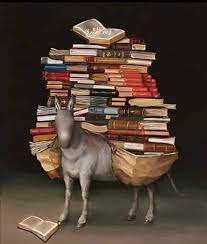
Imaam Ibn Qudaamah Al-Maqdisi rahimahullaah said:
Know verily that, argumentation with the sole intention of defeating others and boasting is the source of evil manners. And this type of unnecessary argumentation leads to pride, conceit and showing off.
The one who is involved in this act, spends all his life studying knowledge that has to do with argumentation and will be of no avail in the Hereafter.
Ethics of the Teacher and the Student.
As for the student, he should start with purifying his soul from all forms of evil manners especially lack of sincerity, for knowledge is the worship of the heart.
He should try to shun away from anything that may distract his attention from the knowledge, for if the heart is distracted, it cannot achieve its objectives.
Thus, he should dedicate his entire life to seeking knowledge.
The pious predecessors used to give precedence to knowledge over anything else.
For instance, it was narrated that Imaam Ahmad – rahimahullaah – did not marry until after the age of forty. This shows how important knowledge is to our illustrious Ulamaa.
The student should be to his Teacher like a patient who needs a physician in order to cure his diseases.
The student should humble himself to his Teacher and he should hasten to serve his Teacher so that he can attain the blessing of the knowledge.
Ibn ‘Abdil-Barr states in ‘Jaamiu’ Bayaan Al-i’lm wa Fadlih’ that Ibn ‘Abbaas radiyallaahu anhu used to hold the reins of Zayd Ibn Thaabit’s mount and drive it saying;
” This is how we were commanded to honor our Ulamaa.”
The student should avoid pride, for pride leads the student to destruction in this dunya and Hereafter.
By so doing, it indicates that the student is not really wise in searching for knowledge.
For it was said;
“wisdom is the missing commodity of a believer, anywhere he finds it, he hastens for it.”
Moreover, the student should further evaluate things and give preference to his teacher’s opinion over his own. This is because the error of a teacher is more beneficial to a student compared to the correctness of the student.
Al-khatib Al-Baghdaadi reported in ‘Al- jaamiu’ li Akhlaaq Ar-Raawi wa Adaab As-Saami’ that Ali radiyallaahu anhu said:
“It is among the rights of the A’lim on you to make salam to him in particular and to the public in general, and to sit before him and do not point hand to him, and you should not send a message to him by winking, and avoid overburdening him with unnecessary questions, nor hastening to give answer to a question in his presence. You should not persist in demanding while he is tired, nor retreat him when he forbids, Do not draw his cloth at his back while he is standing, nor divulge his secrets, nor backbite people in his presence, nor find his faults. If he makes a mistake, his excuse is accepted and do not say to him; I heard so so person said this nor so and so so person said different opinion regarding what you said and do not describe an A’lim in his front. Do not get tired of relating with him nor stop from serving him. If he is in need of something, then you should be the first to provide him his needs, for to you, he is just like a palm tree that you are waiting for it to fall so that you can have it”.
Allaahu A’alam
Baarakallaahu feekum




